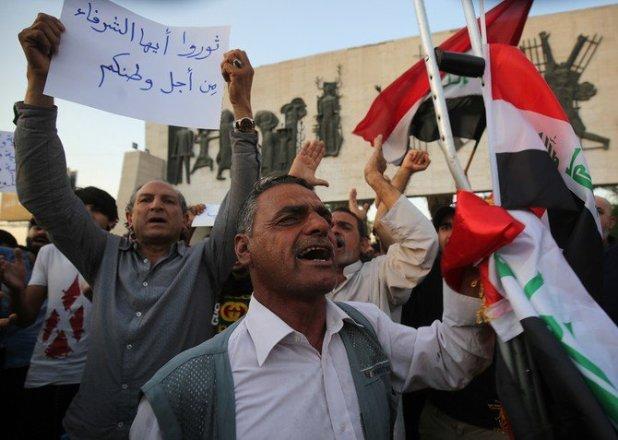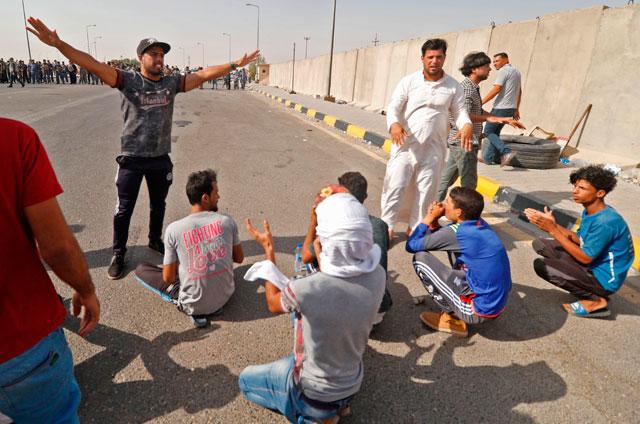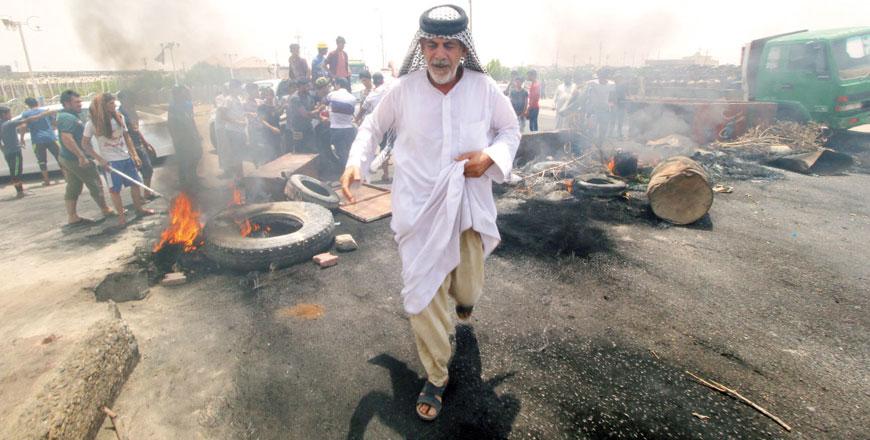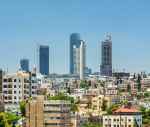You are here
Iraqi police use batons to disperse protesters outside Zubair oilfield
By Reuters - Jul 17,2018 - Last updated at Jul 17,2018

Iraqis wave national flags and hold up signs during a demonstration against unemployment (AFP photo)
BASRA- Iraqi police used batons and rubber hoses to disperse about 250 protesters at the main entrance to the giant Zubair oilfield near Basra on Tuesday as unrest across southern cities over poor basic services gathers pace.
Since demonstrations began nine days ago, protesters have attacked government buildings, branches of political parties and powerful Shiite militias and stormed the international airport in the holy city of Najaf.
Officials and industry sources said the protests have not affected output at Zubair, run by Italy's Eni, and the other major oilfields including Rumaila developed by BP and West Qurna 2 managed by Lukoil.
Many Iraqis believe their Iraqi leaders do not share the country's oil wealth. Some demonstrators said foreign labourers were robbing them of employment at oil companies. Three protesters have been killed, including one at West Qurna 2.
"We the people of Basra hear about the Iraqi oil and its huge revenues, but we never enjoy its benefits," said 24-year-old protester Esam Jabbar.
"Strangers have decent jobs at our oilfields and we don't have the money to pay for a cigarette. That's wrong and must be stopped." Jabbar said he was unemployed.
Iraq is the second-largest producer in the Organization of the Petroleum Exporting Countries after Saudi Arabia.
Crude exports account for 95 percent of state revenue and any disruptions could badly damage its already limping economy at a time when Iraq needs tens of billions of dollars to rebuild after the three-year war with Islamic State.
Prolonged instability in the south could drive up global oil prices. Production at the Zubair field was 475,000 bpd, an Iraqi oil official said in May.
Iraq exported an average of 3.566 million barrels per day from its southern oilfields so far in July, said senior oil officials, levels confirming that the troubles have not disrupted crude shipments from the region.
Demonstrators, who have endured sweltering heat to press their demands, show no sign of letting up.
"We had orders not to use live fire but we also have orders not to allow anyone to disrupt operations at oilfields and we will take necessary measures to keep the protesters away from the fields," said a policeman at the scene.
Protests over the same issues have occurred in the past. The unrest this time is more widespread and is politically-sensitive.
Prime Minister Haider al-Abadi is seeking a second term after a May 12 parliamentary election tainted by allegations of corruption.
Politicians are struggling to form a coalition government. Populist Shi'ite cleric Moqtada al-Sadr, whose political bloc won the majority in the poll, may now be in a stronger position to influence the choice of prime minister.
He defeated Iranian-backed rivals by promising to generate jobs, help the poor and eradicate corruption.
The Shiite heartland south has long been neglected despite its oil wealth, first by Sunni dictator Saddam Hussein and then Shi'ite-led governments after him, including Abadi's.
Murtadha Rahman, 22, ran barefoot on the scorching pavement to try and escape a charge by police outside the Zubair field.
"I live in a place which is rich with oil that brings billions of dollars while I work in collecting garbage to desperately feed my two kids. I want a simple job, that's my only demand," said Rahman, who said he was beaten by police.
"I will not go even if you kill me I will stay her. I want a job."
In a meeting with government officials carried on state television, Abadi promised to allocate funds for water and electricity and create jobs in Basra, once dubbed the "Venice of the Middle East" for its network of canals.
Related Articles
BASRA, Iraq — Iraqi police wielded batons and rubber hoses to disperse about 250 protesters gathered at the main entrance to the Zubai
BASRA, Iraq — Iraqi police fired into the air to disperse protesters demanding jobs and better public services at one of three demonstration
BASRA, Iraq — Iraqi police opened fire to disperse dozens of protesters near the southern oil hub of Basra on Sunday as they demonstrated ag


















